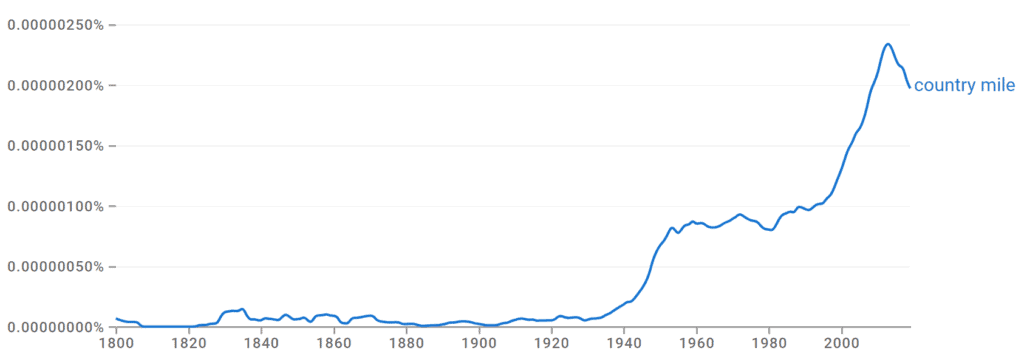Idiomatic expressions are words and phrases that create figurative connections in speech and text for detail and a deeper understanding of the author’s message.
Idioms often have fascinating literal origins, some of which are hundreds, if not thousands, of years old. The phrase a country mile is a couple hundred years old, at the very least, possibly older. It is a way to exaggerate distance and is a famous saying in American baseball.
Learn about its origins and meaning below.
What Is the Meaning of a Country Mile?

When you use the term a country mile, you express a hyperbole or exaggeration of distance.
The literal use infers that a country mile is the fact that most country roads are not in a straight line. Instead, roads in the country tend to meander up and down and all around. This makes it seem as if a mile in the country takes longer to cross than a straight mile in the city.
As an idiom, the figurative use of a country mile highlights something of tremendous or unexpectedly long distance.
For example:
- As the marathon runners crossed the finish line, it was evident that the winner had beaten the rest by a country mile, displaying incredible speed and endurance.
- In the spelling bee competition, Emily’s proficiency in spelling was unmatched, and she won the title by a country mile, leaving her competitors trailing behind.
- She won the footrace by a country mile, obliterating her opponents by a distance that broke track records.
How Long Is a Country Mile?
Although the general consensus is that a country mile is unexpectedly longer than a measurable mile, documentation of its actual distance is hinted at in various early texts.
In 1851, Samual Maunder called “a north-country mile… equal to two statute ones” in his book “The Treasury of Knowledge and Library of Reference.”
In 1863, the distance was again mentioned in the Newcastle Chronicle newspaper:
The spot was stated on the placards to be a mile from the town, but…which generally goes to a “country mile” or what is termed in Scotland “a mile and a buttock” — in fact, nearer two miles than one.
The Origins of a Country Mile

The origins of a country mile are muddied. However, the term is likely derived when the English Statute Mile was established in 1593. Before this time, there was no consistent measurement of a mile. And it probably took rural inhabitants longer to adjust to the accepted length than urban dwellers: hence a country mile versus an urban one.
The oldest reference to a country mile was published in 1829 in Frederick de Kruger’s poem “The Villager’s Tale“:
The travelling stage had set me down
Within a mile of yon church-town;
‘T was long indeed, a country mile.
But well I knew each field or style;
Although the term originated in England, it quickly spread to neighboring English-speaking countries and across the ocean to America. It has taken on various other names, such as a farmer’s mile, Welsh mile, and Scottish mile, but all mean the same thing: to exaggerate a distance.
In America, it has become a famous catchphrase in baseball when a hit is knocked out of the park. It was first used in this manner in 1935 in the “Saturday Evening Post” when sports reporter Peter Tamony wrote:
“He is the answer to a scout’s prayer. He can throw a baseball into a barrel at 100 yards, is a ten-second sprint man, and can hit a ball a country mile.”
Let’s Review
The idiomatic phrase a country mile likely originated in the 16th century. It was used to define the differences between rural and urban travel after a universal measurement of a mile was officially recorded.
The first documented use of the term figuratively was in the early 1800s. And it quickly spread across the UK and other English-speaking countries, where it is sometimes called by other names.
Today, it is a famous catchphrase in American baseball and serves as a hyperbole to exaggerate a distance physically and metaphorically.
Related Articles:
